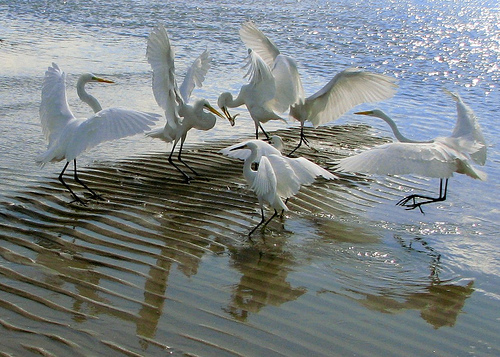Last Saturday we hosted a TeachMeet in the school library. A TeachMeet is an informal gathering of people working in the education sector coming together to share ideas and expertise. It’s a great way to hear about what educators are doing in the primary, secondary, tertiary and public (eg museums) sectors. TeachMeets happen all over the world and meetings are held wherever people are happy to host. The format is simple – you can turn up or you can volunteer to present for either 3 or 7 minutes. There is usually a break for refreshments halfway through and it’s also customary for the hosts to suggest a nearby venue for drinks or dinner after the Meet. And it’s free!

Using bots to teach kids coding (Steve Brophy)
You can see in the wiki that we had a decent number of people attending, from a range of educational backgrounds. I always find that, as a secondary school educator, I learn so much from the primary teachers, from e-learning leaders, from people who work in public libraries and museums. And since the sharing sessions are so short, there is time for what’s most important – the conversations. Many people are also on social media so it’s a good chance to keep in touch later on Twitter or through their blogs, for example.
Order of presentations (see TeachMeet link for shared presentations):
Steve Brophy @stevebrophy Ivanhoe Grammar School K-12: Paper and programming
Bernadette Mercieca @bernm9 Xavier College E-Learning coord/teacher: What are we doing to help early career teachers flourish?
Eleni Kyritsis @misskyritsis Firbank Grammar School: Student Inquiry
Jan Molloy @janpcim Immigration Museum P-tertiary: #AskACurator Sept 16 Getting involved
Catherine Morton @gorokegirl Melbourne High School Teacher Librarian and Fiona Matthews Whitefriars College Lead Coach – Learning, Teaching and Technology : One Conversation at a Time: Peer Coaching
Kim Yeomans @kimyeo St Martin of Tours primary TL: Connecting with authors via Twitter.
Tania Sheko @taniatorikova Melbourne High School How to really get to know people online.
Mel Cashen @melcashen Princes Hill: My reflection from camp
Kristy Wood @Kristy_M_Wood Primary teacher K-6: Teacher wellbeing
If you are interested in learning more about the presentations – since you can’t really get much from the titles – I would encourage you to go to the wiki where some people have already shared links to their presentations next to their names in the program. I’m sure there will be more shared later so check in again.
When I wrote a blog post about my talk – how to really get to know people online – I shared it on Twitter with a few people whom I’d met in an online course (MOOC), Rhizo15. These were people I had mentioned in my post. The morning before the TeachMeet I noticed some feedback from these people (none of them in Australia) which I was able to quickly add to my slide presentation. It was a lovely example of how these relationships continue to evolve long after the course (MOOC) has finished. After the TeachMeet I noticed Kevin Hodgson had even created a comic for us – very special.

The best way to see some of the ideas and passion shared on this day is to look through the Storify below which captures some of the tweets and photos on Twitter.
View the interaction about this TeachMeet on Twitter (Storify).



